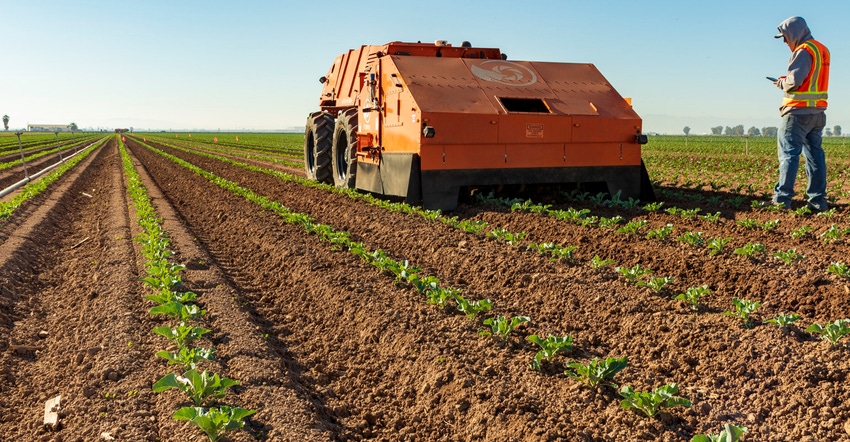
In the Corn Belt, farmers struggle with ever-more resistant weeds and fewer chemical options. In specialty crops growers find fewer people willing to go work long days in veggie fields.
What’s the solution?
A company called Farmwise could have an answer. For the third year in a row, it is deploying an intelligent, autonomous robot cultivator called Titan that uses cameras to identify weeds and mechanically knock them out – even inside a row. The weeding machine is built for specialty crops in California’s Salinas Valley, but the company has big plans to convert the tech to row crop fields in the Midwest in the next few years.
Perfect use case for automation
“Some of the tasks that were historically handled by seasonal field workers today represent great use cases for automation,” says Pauline Canteneur, Head of Business Development and Partnerships for Farmwise. “For many decades and for many reasons including access to an abundant farm labor supply, R&D investments in mechanization in specialty crop farming were quite small. The environment has now changed and is being redefined by farm labor shortages and rising labor costs.”
The Farmwise machine uses AI technology that can capture and process data to automate hand weeding. “Two weeks ago we were able to weed an 18-acre artichoke field in a 10-hour shift with our machines,” says Canteneur. “Comparatively it would have taken about 20 people and two days to finish this job, and we’re offering this service at a cost that’s on par with growers’ hand weeding.”
Canteneur believes in the future the machine can help tackle weed control as herbicide choices begin to dwindle.
“I’ve talked with several corn belt and southern weed scientists as well as growers, and the consensus in this industry is the future of weed control will not rely purely on chemical options,” says Canteneur. “We have to start thinking about introducing alternative methods of weed control.”
Clearly, ‘Titan’ is not your grandpa’s cultivator.
“There’s tons of stuff we can do with automation so that the driver does not have to fear knocking down crops,” says Canteneur.
Shifting to Corn Belt
The current machine is designed for specialty crops, but the FarmWise team is looking to adapt the tech to broadacre organic crops that have limited access to chemical weed control. That could be a game changer for organic yields, which has long been the reason why Midwest farmers shy away from those enterprises.
“There are tremendous opportunities to bring eyes and brains to traditional cultivators in those organic acres,” she says. “We know we have work to do when it comes down to adapting our current system to the scale of Midwestern row crop operations but the IP we’ve developed and continue to expand onto is extremely relevant to the challenges farmers are facing.”
Down the line, the company plans to leverage their core competencies to help sprayers get smarter.
“Weed control is different between specialty and commodity crops, but the challenges are similar starting with both the decreasing availability and efficiency of herbicides,” Canteneur says.
In any case, weed control is about to get more precise, less costly, and more environmentally friendly. John Deere’s See & Spray Ultimate is already commercially available; the market for AI-driven technology is about to become more competitive.
“If we can put eyes and brains on sprayer booms to target just the weeds themselves rather than blanketing the field, you could be saving a lot of gallons of herbicide per acre,” she concludes.
As the Farmwise machine moves, cultivating knives dart in and out of the crop row at lightning speed. Watch the machine in action:
Learn more about new ag technology in our New Tech Now series.
About the Author(s)
You May Also Like






